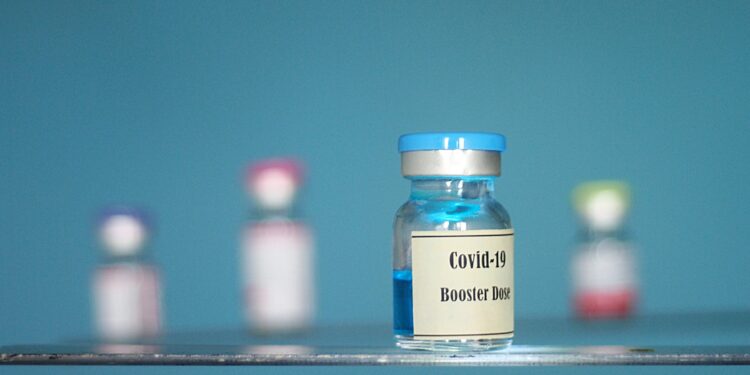Credit: Unsplash/CC0 Public domain
Reducing the dose of a widely used COVID-19 booster vaccine produces a similar immune response in adults to a full dose with fewer side effects, according to a new study.
The research, led by the Murdoch Children’s Research Institute (MCRI) and the National Center for Communicable Diseases of Mongolia, found that half a dose of a Pfizer COVID-19 booster vaccine caused an immune response not inferior to one dose complete in Mongolian adults who had already received AstraZeneca or Sinopharm COVID-19 injections. But it found that a half-booster dose may be less effective in adults vaccinated with the Sputnik V COVID-19 vaccine.
The research is part of an international clinical trial, which also includes Australia and Indonesia, that is studying different COVID-19 booster approaches to help guide future vaccination strategies.
The first batch of results, published in The Lancet Regional Health – Western Pacific, and involving 601 participants from Mongolia aged over 18, reports the first responses observed 28 days after vaccination. The study is the first of its kind to evaluate and compare COVID-19 vaccines widely used in low- and middle-income countries.
MCRI’s Professor Kim Mulholland, who also sits on the WHO SAGE committee, said the study found that split doses caused an immune response not inferior to a full dose, with fewer side effects and less costly .
“Split dosing can improve acceptability and uptake of the COVID-19 booster and reduce the cost per dose of COVID-19 booster programs,” he said. “Policymakers and immunization advisory committees can rely on this data to make flexible decisions about vaccination schedules.”
The study found that participants given a half dose reported fewer local reactions than those given full doses (60 percent versus 72 percent), including less pain and tenderness. They also reported fewer systemic reactions (25 percent versus 32 percent), including less fever, vomiting, diarrhea and headache.
The cohort will be followed at six and 12 months with data to answer key questions about other aspects of the immune response, including the rate of decline and breakthrough of infections.
Dr Melanie Saville, Executive Director of R&D at CEPI, said: “This CEPI-funded study has generated valuable data on vaccine combinations that have been widely distributed through COVAX, which will help inform future vaccine strategies. recall in the countries of the South. Split dosing can contribute to equitable access by making vaccination more acceptable and less expensive. »
Researchers from Onoshmed Laboratory, Sukhbaatar District Health Center, General Clinical Pathology Laboratory, University of Melbourne, Mongolian National University of Medical Sciences, Bayangol District Health Center, Ministry of Health of Mongolia and the National Public Health Center of Mongolia also contributed to the study. results.
More information:
Tsetsegsaikhan Batmunkh et al, Immunogenicity, safety and reactogenicity of a half-dose or full-dose BNT162b2 (Pfizer-BioNTech) booster after a two-dose priming schedule of ChAdOx1 nCoV-19, BBIBP-CorV or Gam- COVID-Vac in Mongolia: a randomized, controlled, non-inferiority trial, The Lancet Regional Health – Western Pacific (2023). DOI: 10.1016/j.lanwpc.2023.100953
Provided by the Murdoch Children’s Research Institute
Quote: Split COVID-19 booster vaccines produce similar immune response as full doses, study finds (November 24, 2023) retrieved November 24, 2023 from
This document is subject to copyright. Apart from fair use for private study or research purposes, no part may be reproduced without written permission. The content is provided for information only.



